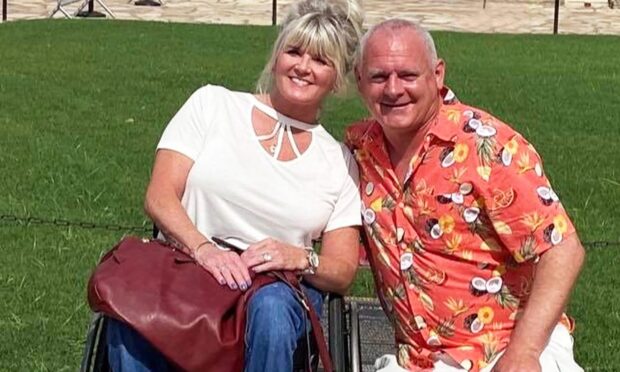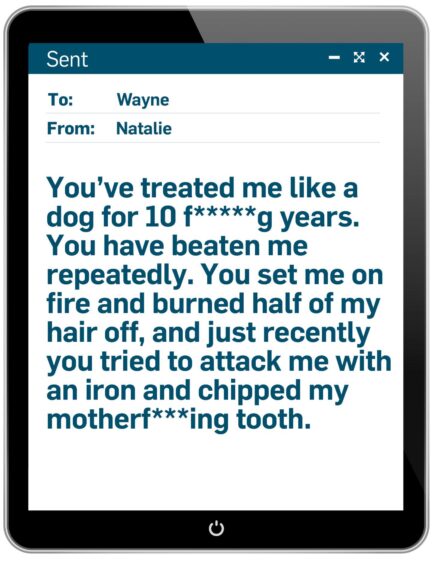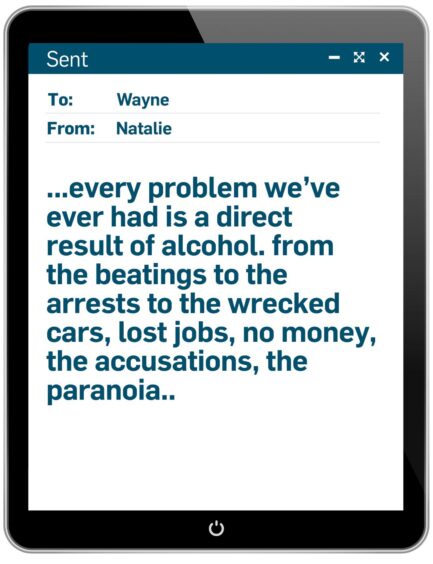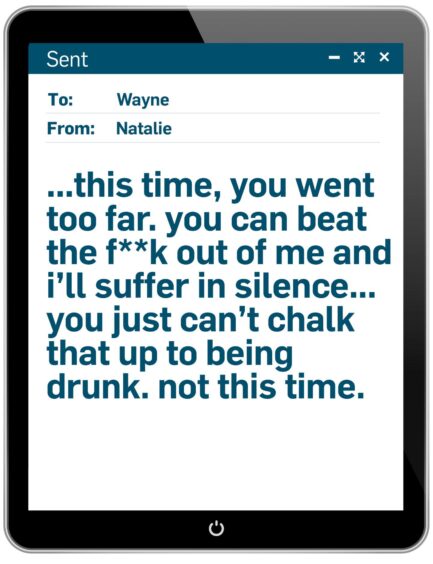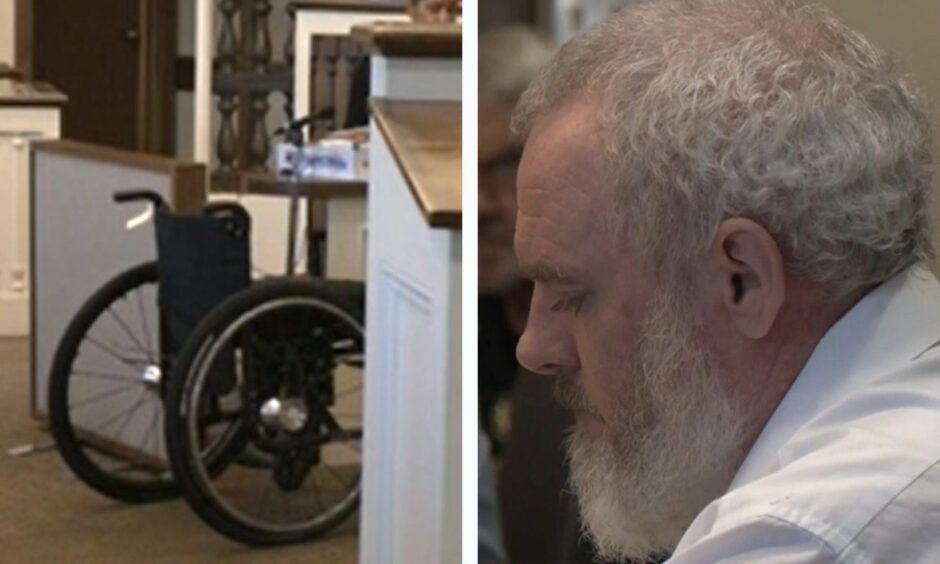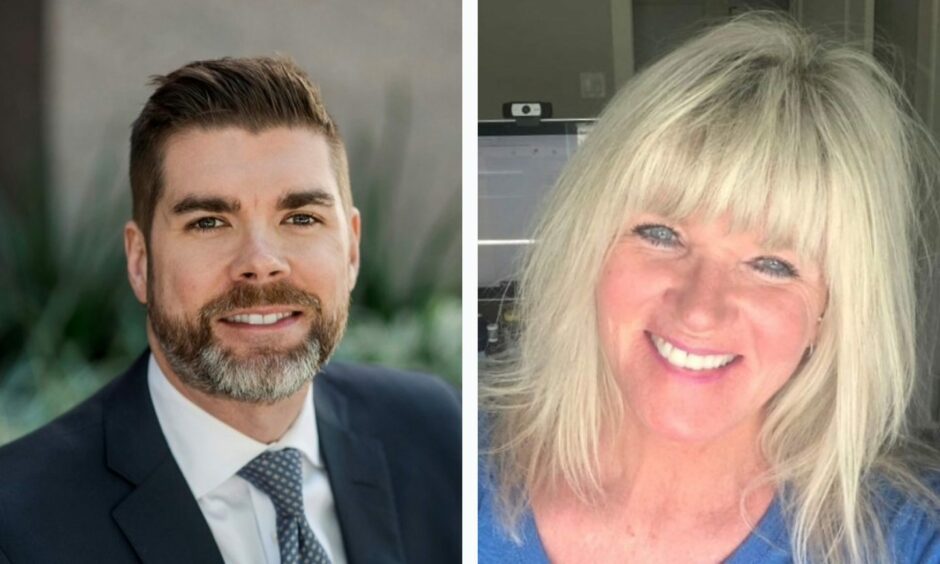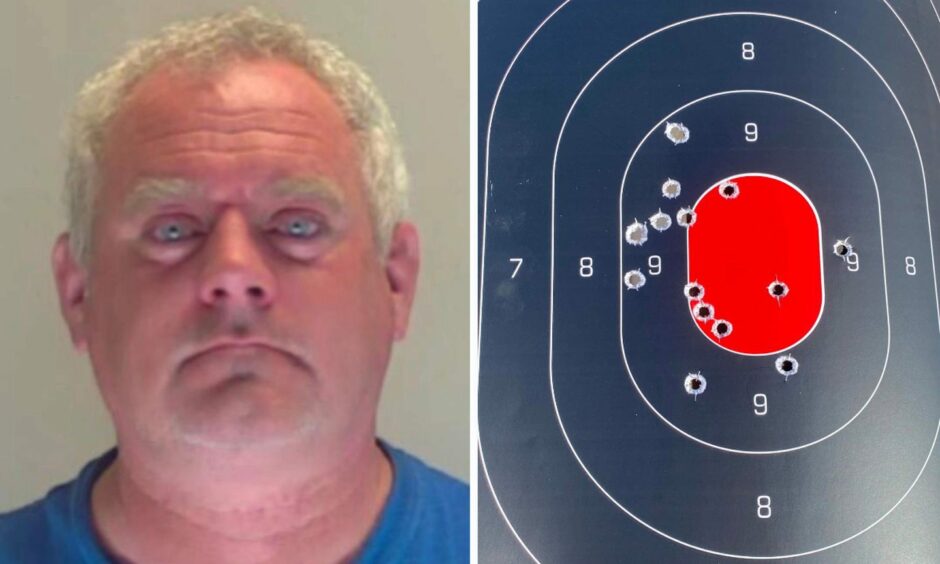A university lecturer was secretly treated “like a dog” for 10 years before a Mintlaw man shot her dead, chilling newly released emails have claimed.
Wayne Fraser, 49, cruelly blasted his wheelchair user wife Natalie Ryan-Fraser in the neck with her handgun on December 30 2021 and is currently serving 20 years behind bars in the USA for her killing.
A Mississippi jury disagreed with the state prosecutor that Fraser was guilty of murder, instead finding him guilty of culpable negligence manslaughter.
However, the Scots expat, who was also fined $10,000 in September 2023, has since asked senior judges to overturn his conviction, claiming “prejudicial” legal errors and “incompetent” evidence led to an “unfair” trial.
Now, papers filed with the Supreme Court of Mississippi include harrowing emails in which Natalie detailed a decade of domestic abuse.
“You’ve treated me like a dog for 10 f*****g years,” she wrote in an email more than two years before her death, adding: “You have beaten me repeatedly.
“You set me on fire and burned half of my hair off, and just recently you tried to attack me with an iron and chipped my motherf*****g tooth.”
In another email, also sent in September 2019, Natalie stated that “every problem” the pair had ever endured – “from the beatings to the arrests to the wrecked cars, lost jobs, no money, the accusations, the paranoia” – was all “a direct result of alcohol”.
The disturbing emails were used as evidence to prosecute Fraser, along with five shocking photos saved on Natalie’s mobile phone between 2017 and 2019.
She had taken them herself, and they showed severe injuries to her face.
Fraser denied first-degree murder
When he stood trial at Lowndes County Courthouse in the southern city of Columbus, Fraser denied first-degree murder.
The ex-pupil of Mintlaw Academy and former student at Banff and Buchan College claimed Natalie had accidentally shot herself while they were both drunk on vodka.
However, he did not call for help at the time of the shooting, waited five hours, and then sent a text message to his boss.
It stated Natalie had “pulled the gun to her head whilst in [his] hand,” adding: “s**t happens I guess when you drunk or don’t give a f.”
Next, Fraser called Natalie’s brother, Kory Ryan, claiming she had died by suicide, also telling him: “I’m f****d Kory.”
The trial before Judge James T Kitchens Jr ended with jurors convicting Fraser of the lesser manslaughter charge.
It prompted Fraser to instruct his taxpayer-funded lawyer, George T. Holmes, to launch an appeal on four grounds, arguing:
- “Irrelevant and old” alleged bad character evidence “improperly and
unduly influenced” the trial with the jury’s consideration of Fraser’s accident claim “irreparably prejudiced”. - Fraser was “denied due process” because the trial court had excluded a defence expert’s “crucial” evidence on the distance of the fatal gunshot.
- The state “unfairly benefited” from withholding an email that the defence considered “exculpatory” evidence.
- The prosecution’s evidence was “insufficient” to prove the charge of culpable negligence manslaughter.
‘Trustworthiness’ of victim’s emails and relevance of ‘old’ photos questioned
In the appeal court papers, known as briefs, Mr Holmes branded Natalie’s damning emails “not trustworthy”.
He wrote that they were sent at a time of an “ongoing, almost-marriage-ending” argument 26 months before she lost her life.
Mr Holmes also challenged the relevance of the “old” photos that were “anywhere from four to two years old”.
Writing about the couple, he stated: “They may have gone through a rough patch for a time in 2019 and 2020, but that was ancient history by the time 2021 came to an end.”
The defence counsel went on: “The emails in which Natalie accused Fraser of mistreatment and the photographs of Natalie with a bruised face may have been relevant if they were more recent and if there was some evidence of abuse occurring the evening of the tragedy or at least close in time.
“As presented, however, the evidence was remote hearsay and irrelevant and prompted the jury to speculate.”
Attorney General brands appeal arguments ‘meritless’
In the state’s response to Mr Holme’s brief, Special Assistant Attorney General Allison Horne dismissed his arguments.
She branded them “meritless” and urged the judges to reject them.
Ms Horne also highlighted the “secretive nature” of Natalie’s abusive marriage with Fraser and noted: “Fraser never denied the abuse in the email exchanges.”
She also pointed out his “contradictory” claims.
“Fraser says that the emails and photos prejudiced his accident defense … yet also simultaneously says (concedes) that the emails and photos were irrelevant to his culpable negligence manslaughter conviction.
“While the proof was certainly relevant to disprove his accident defense in his first-degree murder trial, Fraser is right in saying that … proof was irrelevant to his culpable negligence manslaughter conviction, and that is precisely why the proof could not have prejudiced him.”
‘Natalie had fallen while transferring from her wheelchair to bed, and Fraser refused to help’
The brief, submitted on behalf of the Attorney General, included Natalie’s shocking emails in full and other details of troubling incidents before she was killed.
One of those, in 2019, involved her brother Kory Ryan, who gave evidence against Fraser during his trial.
Ms Horne explained: “Natalie called Ryan in the middle of the night, crying because she had fallen while transferring from her wheelchair to bed, and Fraser refused to help her up.
“Ryan asked Natalie to give Fraser the phone, and Fraser laughed at Ryan.
“Only after Ryan said he would drive several hours there to help Natalie did Fraser help her.”
The state’s papers also said that “Fraser’s behaviour while drinking was so out-of-control” that he was “asked to leave and escorted out” at a Ryan family function.
“Fraser was not welcome at Natalie’s family events after that incident,” Ms Horne added.
Part of an email sent by Natalie to Fraser on September 25 2019 read: “…this time, you went too far. you can beat the f**k out of me and i’ll suffer in silence … you just can’t chalk that up to being drunk. not this time.”
An email Fraser sent to Natalie’s brother, Kory, after he was detained in the county jail awaiting trial, became a contentious issue during the proceedings.
Part of it read: “Natalie gave the gun to me, no safety, I [was] going to put the gun back in the drawer, she turn[ed], I turn[ed], both bumped into each other and – What happened was instant! From that moment shock kicked in.”
It contradicted the defence’s case that Natalie “became extremely intoxicated and reached towards the gun in Fraser’s hand causing the weapon to discharge”.
However, it emerged that the prosecution had not disclosed the email’s existence to Fraser’s lawyer and then tried to use it as evidence to unravel his defence.
Despite Fraser’s objection at the time of his trial, the contents of his jail email were revealed to the jury.
…she turn[ed], I turn[ed], both bumped into each other and – What happened was instant! – Wayne Fraser’s jail email to his victim’s brother
In the appeal brief, Mr Holmes accused prosecutors of “cheating plain and clear”.
He said: “[They] did not expect they would need the email and strategically and improperly held it back and did not disclose it because it was exculpatory and supported Fraser’s defense.
“The trial court should have excluded Fraser’s email to Ryan as a sanction for the State’s clumsy intentional hiding of exculpatory evidence.”
Email ‘error was not prejudicial and thus harmless’
In response, the Special Assistant Attorney General recalled that Fraser had actually proposed to “meet in the middle” by allowing the jail email into evidence in exchange for excluding Natalie’s emails and photos.
However, the court rejected his offer.
Ms Horne suggested that any error in admitting evidence was “harmless”.
She explained: “Fraser’s jail email was inconsistent with his other accident claims, but Fraser had already given many inconsistent statements about Natalie’s death.
“And those other statements proved his guilt of culpable negligence manslaughter.
“So if there were any error in admitting the jail email, such error was not prejudicial to Fraser and thus harmless beyond a reasonable doubt,” Ms Horne argued.
The justice official recalled that Fraser had “inconsistently” claimed that Natalie pulled the gun to her head, face, or neck.
“He inconsistently claimed that Natalie pulled his arm, hand, or the gun.
“He was also inconsistent about whether he and Natalie were arguing at the time, at first stating they were not, then later saying that he and Natalie were indeed arguing but it was ‘not malice’.
“Then Fraser claimed in his jail email to [Kory] Ryan that he and Natalie simply bumped into each other, causing the gun to fire.
“In all his stories, though, Fraser admitted that he was drunk,” Ms Horne concluded.
Another issue the state addressed was Fraser’s complaint that his expert witness, said to be “crucial” to getting him out of trouble, was stopped from giving evidence.
His defence counsel described Dr Jeff Goudeau as an expert in the fields of firearm forensics and crime scene analysis.
“After testifying about the gun, Fraser’s counsel sought to elicit Dr Goudeau’s opinion testimony about the distance of the shot,” Mr Holmes explained.
He went on: “The state objected that shot distance was outside Dr Goudeau’s area of expertise and that his opinion had not been previously disclosed.
“It is fundamentally unfair and reversible error for the state [pathologist] to present expert testimony and then for the trial court to deny a defendant the opportunity to counter that evidence,” Mr Holmes added.
Appeal court papers revealed Dr Goudeau earned $5,739.98 for his court appearance, paid for by the public purse.
Judges have 270 days to rule
Answering the complaint, the Attorney General’s office argued in its brief that restricting Dr Goudeau’s evidence was “not an abuse”.
Ms Horne said: “Fraser argues that the trial court abused its discretion in restricting a portion of his expert’s testimony based on his failure to timely produce his expert’s report, which he gave to the State the night before his testimony.
“But the trial court acted within its discretion in limiting the testimony of Fraser’s expert due to the State’s inability to rebut the expert’s opinion because of the late disclosure.”
Even though Dr Goudeau had conducted all testing alongside the state’s expert, Fraser’s defence did not disclose his expert’s report until 6pm the night before his testimony.
It also came after the state had already released the forensic pathologist from the witness stand.
Ms Horne added that “the trial court ruled that Dr Goudeau could not opine on distance since his report was not timely disclosed, leaving the State without the ability to recall its released expert to respond.”
Fraser, a former offshore worker in the North Sea who also worked at a butcher’s in Mintlaw, now faces a long wait to learn whether the judiciary will order the requested “reversal of his conviction and a new trial”.
A Mississippi Supreme Court staffer told The P&J: “The brief and replies go to the judges and then they have 270 days to rule on this particular case, unless motions in between slow the case.”
Read more:
‘Madcap’ killer husband was a ‘wild card’ and a ‘strange one’ – former workmates reveal
For all the latest court cases in Aberdeen as well as crime and breaking incidents, join our Facebook group.
